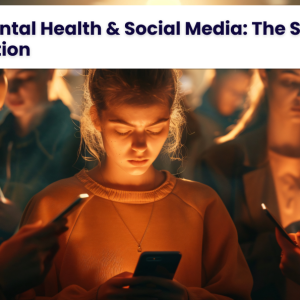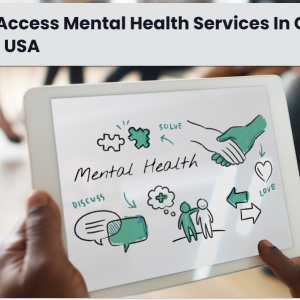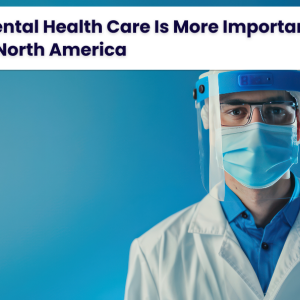
The Connection Between Mental Health and Nutrition
When people think about mental health, they often focus on factors like therapy, mindfulness, or exercise. But what we eat plays a crucial role in how we feel mentally and emotionally. Nutrition impacts our brain function, mood, and even how we cope with stress, anxiety, and depression. With mental health issues on the rise, especially in places like the USA and Canada, it’s important to recognize the powerful connection between what we eat and how it influences our mental well-being.
In this blog, we’ll explore how nutrition affects mental health, highlight foods that can support emotional balance, and offer practical tips for incorporating brain-boosting foods into your diet.
How Nutrition Affects Mental Health

The relationship between mental health and nutrition is complex, but the science is clear: what we eat affects how our brain functions, and this can either support or harm our mental health. Here are a few ways nutrition directly influences the mind:
1. Gut-Brain Connection
The gut and the brain are closely connected through the gut-brain axis, a communication network that links emotional and cognitive centers of the brain with our digestive system. This connection means that what we eat can influence brain function and mood. In fact, about 90% of serotonin (a key neurotransmitter that affects mood) is produced in the gut.
Why It Matters:
- A healthy gut supports the production of neurotransmitters like serotonin and dopamine, which regulate mood.
- Poor gut health, influenced by a poor diet, can lead to inflammation and negatively impact mental health, increasing the risk of anxiety and depression.
2. Blood Sugar Stability
Our brain requires a steady supply of glucose (sugar) to function optimally. Eating a diet high in refined sugars and processed foods can cause blood sugar spikes followed by crashes, leading to irritability, fatigue, and mood swings.
Why It Matters:
- When blood sugar levels are stable, the brain functions better, leading to improved focus, mood, and energy levels.
- Constantly fluctuating blood sugar levels can contribute to mental health disorders, particularly anxiety and depression.
3. Nutrient Deficiencies
Certain nutrients are essential for maintaining good mental health. Deficiencies in key vitamins and minerals like omega-3 fatty acids, B vitamins, magnesium, and zinc can negatively affect brain function and mood regulation.
Why It Matters:
- Omega-3 fatty acids are crucial for brain health and reducing inflammation, while B vitamins support energy production and neurotransmitter function.
- Nutrient deficiencies are associated with higher rates of depression, anxiety, and cognitive decline.
Foods That Support Mental Health

Choosing the right foods can help protect and even improve mental health. Here are some key nutrients and food groups that nourish both the brain and the body:
1. Omega-3 Fatty Acids
Found in fatty fish like salmon, mackerel, and sardines, omega-3s are known to support brain function and reduce inflammation. They play a vital role in the development and maintenance of brain cells, and studies show they can help reduce symptoms of depression and anxiety.
Foods Rich in Omega-3s:
- Fatty fish (salmon, mackerel, sardines)
- Flaxseeds and chia seeds
- Walnuts
- Omega-3 fortified foods (like eggs or dairy)
2. Probiotic-Rich Foods
Given the gut-brain connection, incorporating probiotic-rich foods can promote a healthy gut microbiome, which is essential for mood regulation. Probiotics help increase the diversity of good bacteria in the gut, supporting better digestion and mental well-being.
Foods Rich in Probiotics:
- Yogurt with live cultures
- Kefir
- Sauerkraut and kimchi
- Kombucha
- Miso
3. Leafy Greens and Vegetables
Leafy greens like spinach, kale, and broccoli are packed with folate, a B vitamin that helps produce neurotransmitters that regulate mood. Studies suggest that a diet rich in vegetables can lower the risk of depression.
Examples of Nutrient-Dense Vegetables:
- Spinach
- Kale
- Broccoli
- Swiss chard
4. Whole Grains
Whole grains like oats, brown rice, and quinoa provide a steady release of energy by stabilizing blood sugar levels. They also contain B vitamins, which are vital for maintaining energy levels and brain health.
Healthy Whole Grains:
- Oats
- Brown rice
- Quinoa
- Barley
5. Antioxidant-Rich Foods
Foods rich in antioxidants, like berries, nuts, and seeds, help protect brain cells from oxidative stress, which can contribute to anxiety and depression. Antioxidants also reduce inflammation in the body, which is linked to better mental health outcomes.
Foods High in Antioxidants:
- Blueberries
- Dark chocolate
- Almonds
- Pumpkin seeds
Tips for Incorporating Brain-Boosting Foods into Your Diet

Maintaining a mental health-friendly diet doesn’t have to be complicated. Here are a few simple tips to help you integrate these foods into your daily routine:
1. Plan Balanced Meals
Aim to create meals that include a balance of protein, healthy fats, and complex carbohydrates. For example, a salmon salad with leafy greens, avocado, and quinoa would be a brain-boosting meal full of omega-3s, fiber, and essential nutrients.
2. Snack Smart
Instead of reaching for processed snacks like chips or candy, opt for snacks rich in healthy fats and fiber. A handful of walnuts or a small bowl of yogurt with berries can keep your blood sugar stable and provide essential nutrients for brain health.
3. Incorporate More Fish
Try to eat fish at least twice a week to get the brain-boosting benefits of omega-3 fatty acids. If you’re not a fan of fish, you can supplement with flaxseeds or chia seeds, or talk to your doctor about an omega-3 supplement.
4. Hydrate
Staying hydrated is also key to mental health. Dehydration can lead to cognitive impairment, fatigue, and mood swings. Drink plenty of water throughout the day and reduce sugary or caffeinated beverages.
The Role of Supplements

While it’s always best to get nutrients from whole foods, supplements can help fill in gaps in your diet. Omega-3 supplements, probiotics, and multivitamins can support mental health, but they should be used under the guidance of a healthcare professional.
Summary
The connection between mental health and nutrition is undeniable. A diet rich in whole foods, healthy fats, and essential nutrients can support brain function and improve mood, while a diet high in processed foods can lead to mental health struggles. By incorporating foods that promote brain health and maintaining a balanced diet, we can nourish not only our bodies but also our minds. Whether you’re in the USA or Canada, focusing on your nutrition is a powerful way to support long-term mental health.





